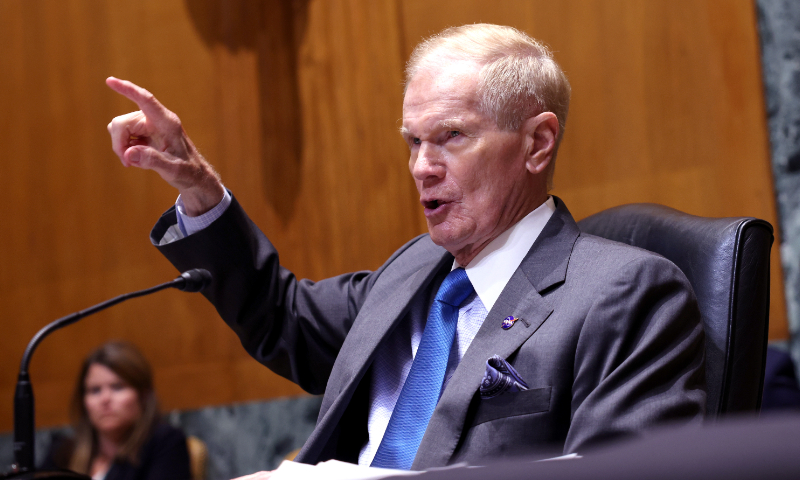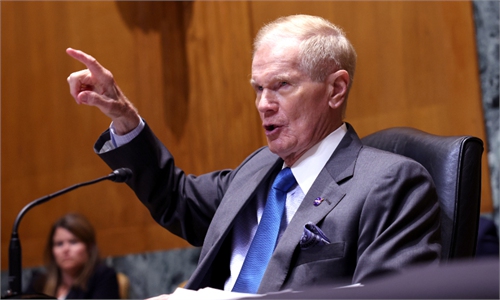
National Aeronautics and Space Administration (NASA) Administrator Bill Nelson testifies during a Senate Appropriations Subcommittee on NASA's fiscal year 2022 budget request at the Dirksen Senate Office Building on June 15, 2021 in Washington, DC. Photo: VCG
NASA administrator Bill Nelson warned on Saturday about China's space program, saying "We should be very concerned that China will land on the moon and say: 'This is ours now and you are going to stay out.'" As the chief of the US space agency and a former payload specialist who has flown in space, Nelson, who is supposed to be mindful of the future of humanity, is too narrow-minded by hyping the "China threat" in space.Song Zhongping, a Chinese military expert and TV commentator, told the Global Times that the US is in fact viewing the moon with a colonial mentality. China has always made efforts to build a community with a shared future for humankind. The country always believes that the moon does not belong to any country alone, but to all humanity. The fierce competition in space between the US and Soviet Union during the Cold War was to seek world technological hegemony, while China's space program is for peaceful purposes, believing that the progress of human civilization should rely on the joint improvement of the whole international community, rather than the monopoly of science and technology. This is the essential difference between China and the US.
Nelson, in his conversation with Bild, added that "China's space program is one military space program," and unlike the American "Artemis" program, the Chinese "do not want to share the results of their research and the moon to use together," which is unbelievably assertive: the US itself has been eyeing militarizing space, it accuses China of doing so.
China and Russia first released the joint draft Prevention of an Arms Race in Outer Space treaty in 2008 and amended it in 2014, aimed at banning the deployment of weapons in space, but it was rejected both times by the US. Isn't it the US that is standing in the way of space weapons non-proliferation?
For the US to cooperate with China, including asking China to share data and samples from the moon, it first needs to repeal the Cox Report, which accused China of "covert operations within the US during the 1980s and 1990s," as well as the Wolf Amendment, passed by the US Congress in 2011, which prohibits NASA from using government funds to engage in direct, bilateral cooperation with the Chinese government and China-affiliated organizations from its activities without explicit authorization.
As a result, "protecting its American counterpart" becomes a realistic consideration for China's National Space Administration, since the unfortunate US restrictions on cooperation prevent NASA from getting lunar samples obtained by China's Chang'e probe. It is thus clear that the US is always following double standards on various issues including in space, that is, morally accusing China while practically refusing to cooperate with it. Its original intention is quite straightforward: as a country that wants to achieve global hegemony by monopolizing technologies, the US is concerned about China's accelerated scientific and technological development.
Moreover, the US space program is plagued with problems. Internally, the government changes the country's route and policies from one president to the next, wasting plenty of time and money. And the increasingly prominent racial discrimination and the suppression of minorities in the US has led to the loss of many minority talents, with the aging problem standing out in the US space field, which are the biggest constraints on the development of US space industry, Song noted.
The US used to be an innovative country, but now it is somewhat sluggish on the road to innovation due to institutional constraints. Essentially, the US political party system has resulted in a country that is not able to focus on big things, using space programs as an ornament, or even a sacrifice, for partisanship.
Externally, the US wants to keep the so-called core technology firmly in its own hands, and refuses to coordinate with others, including not only China and Russia, but also many of its allies, for fear of "core technology leakage." The door to the world is shut by the US itself, the result of which is the pace of US development in space industry slowing down.
The US is now regarding China as its imaginary enemy at all times to contain China, which will undoubtedly cost it a lot. The US is now in a de facto arms race in space, which will do nothing good to its space industry. Song pointed out that only when the world's major developed countries in science and technology join together can we provide more impetus to the progress of human civilization. This is exactly the Chinese idea of building a community with a shared future for humankind, but this forward thinking is apparently not a choice of the US now.


